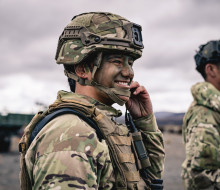
Keeping skills alive in transfer to Reserve Force
05 July 2024
Unfortunately you are viewing this website on an outdated browser which does not support the necessary features for us to provide an adequate experience. Please switch to a modern browser such as latest version of Google Chrome, Mozilla Firefox, Apple Safari or Microsoft Edge.
Ngā mihi nui
Able Communications Warfare Specialist Ashley O’Connor-Palmer says she loves to represent her I-Kiribati side and educating people on her country. She tells her story:
“I spent my early childhood in Fiji and my family moved to New Zealand. I joined the Navy at the beginning of 2020 because I wanted to help people. I think if my younger self could see me now she’d be proud but a bit confused because I initially wanted to join the Army. I’m sure she’d think how cool it is that I have the opportunity to live abroad for work and get to travel for a living. I’m so proud to have had the opportunity to do that in uniform.
“I’m a Communication Warfare Specialist. I handle military messaging, satellite and tactical, visual and radio communications. I’ve served aboard frigate HMNZS Te Mana in Canada for almost a year while it was being upgraded, and participated in operations in Fiji in 2023 while aboard HMNZS Canterbury. I also had the opportunity to represent the NZDF in the Solomon Islands for the 80th Anniversary of Allied Landings at Guadalcanal in 2022.
“I’m I-Kiribati and New Zealand European. Being a mix creates a lot of confusion as I do not look I-Kiribati at all. But I still love to represent my I-Kiribati side and educating people on my country as it’s still quite unheard of to most people.
“I-Kiribati people are very compassionate, friendly and extremely hard-working people who love to have a laugh.
“I have a really strong appreciation for our language and culture – especially the dancing! As a child it was something I enjoyed the most. It was hard work learning and training for it, but that is what made it rewarding. It’s a very unique style which follows our national animal, the frigate bird.
Serving in the Royal New Zealand Navy, I wear my uniform with the same pride that I would have when wearing traditional Kiribati wear.
“Respect is value most I-Kiribati people practise and something I bring every day to my work. We treat our elders with the highest respect due to them living a long life and the knowledge they pass on to their family and children. At work, I respect those of higher rank. It’s not quite the same - I wouldn’t go out of my way to cook and clean for them personally like I would for my grandparents or great aunties and uncles! But my cultural values definitely taught me discipline and to learn to be able to follow orders when given them without complaining.
“My mother has been a big influence. She brought my sister and I up on I-Kiribati cultural values and practices. For that I am incredibly grateful.
“I keep my language alive by going out of my way to learn more, speaking it at home and teaching my niece and nephew, so they can grow to appreciate the culture and language.
“It’s very in keeping with the theme for this year’s Kiribati Language Week: Eutakirakean ma kabwaekekean ara taetae ni Kiribati ma kateira ao rabakaura, bon maurin ao tokabetin te I-Kiribati. ‘Thriving and flourishing our Kiribati language, culture and knowledge build I-Kiribati resilience and prosperity.’”